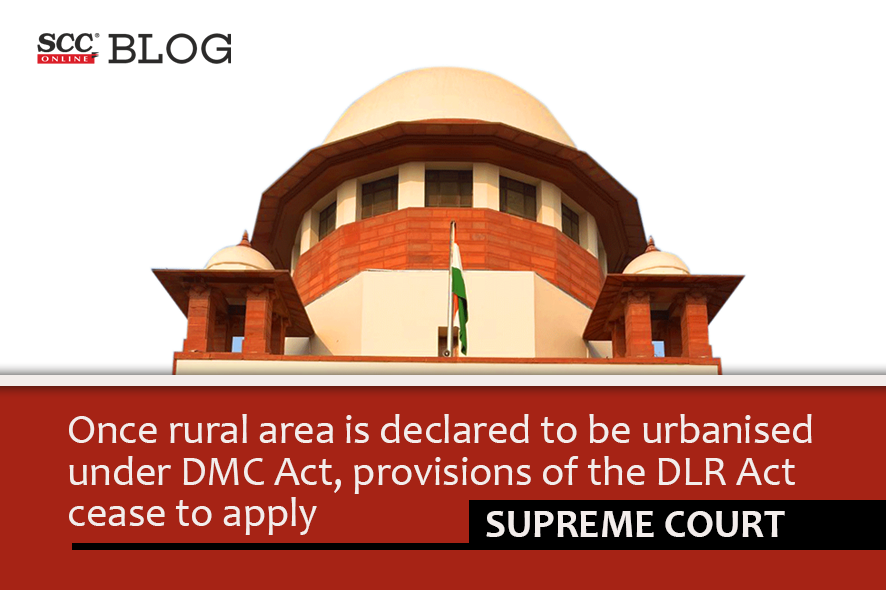Supreme Court: In appeal against the judgment and order passed by the Delhi High Court, wherein the Court held that once the rural area is urbanised by issuance of a notification under Section 507(a) of the Delhi Municipal Corporation Act, 1957 (‘DMC Act 1957’), it ceases to be governed by the provisions of the Delhi Land Reforms Act, 1954 (‘DLR Act 1954’) in sequel thereto and held that the proceedings under DLR Act, 1954 were non est, the full bench of Ajay Rastogi*, C.T. Ravikumar and Bela M. Trivedi, JJ. upheld the impugned judgment and order and directed the appellants to hand over physical possession of the land, free from all encumbrances to the respondents within a period of two months from the date of passing of this order.
The question of law that raised for consideration is that once the rural area is urbanised by issuance of notification under the DMC Act 1957, what will be the effect to the provisions of the DLR Act, 1954 in sequel thereto.
The Court noted that the DLR Act, 1954 was enacted with an object to create a uniform body of peasant proprietors without intermediaries, for the unification of the tenancy laws in force in Delhi and to make provisions for other matters connected therewith. Further, it took note of Section 1(2) of the DLR Act, 1954 that extends to the whole Union Territory of Delhi but shall not apply to the areas notified in Section 1(2)(a) of the Act, 1954, i.e., such an area which are or may before the first day of November 1956 be included in a Municipality or a notified area under the relevant Acts.
The Court said that these provisions clearly indicate that the DLR Act 1954 will not cover such area as defined in the first instance which may or before the first day of November 1956 be included in a Municipality. The ‘land’ which has been defined under Section 3(13) provides that except in Sections 23 and 24, such of the land held or occupied for purpose connected with agriculture, horticulture or animal husbandry and further includes other categories are part of land, but at the same time, it does not include land occupied by building in belts or areas adjacent to Delhi town.
The Court noted that Delhi town’ has been defined under Section 3(5) of the DLR Act which clearly defines that areas which immediately before the establishment of the Municipal Corporation of Delhi were included in the limits of Delhi Municipality. There is complete exclusion of the land occupied by buildings adjacent to Delhi town which falls before the establishment of Municipal Corporation of Delhi and is not a land covered for the purpose by deciding rights of the parties under tenure holder under Chapter II of the DLR Act, 1954.
Further, it said that once there is a notification issued by the competent authority in exercise of power under Section 507(a) which is a special provision in reference to rural areas, such of the rural areas cease to be included therein upon issuance of the notification and shall thereafter include in, and form part of the urban areas in terms of the notification. Sub-clause (b) and (c) of Section 507 deals with the nature of grant of exemption or levy of taxes for such of the areas falling within the scope and ambit of the DMC Act, 1957.
The Court, after harmonising the provisions of the Act, DLR 1954 and DMC Act 1957, viewed that once a notification has been published in the exercise of power under Section 507(a) of the DMC Act, 1957, the provisions of the DLR Act, 1954 cease to apply. In sequel thereto, the proceedings pending under the DLR Act, 1954 become non est and lose its legal significance.
Thus, the Court approved the view expressed by the division bench of the Delhi High Court in Indu Khorana v. Gram Sabha, 2010 SCC OnLine Del 1334.
In exercise of our power under Article 142 of the Constitution and to do complete justice to the parties, the Court directed the appellants to hand over physical possession of the land, free from all encumbrances to the respondents within a period of two months from the date of passing of this order.
Further, it said that if the appellants fail to hand over possession within the stipulated time, it will be open to the respondents to make an application to the jurisdictional Judicial Magistrate and after obtaining necessary orders may proceed for taking possession of the subject land.
[Mohinder Singh v. Narain Singh, 2023 SCC OnLine SC 261, decided on 14-03-2023]
∗Judgment authored by: Justice Ajay Rastogi.







